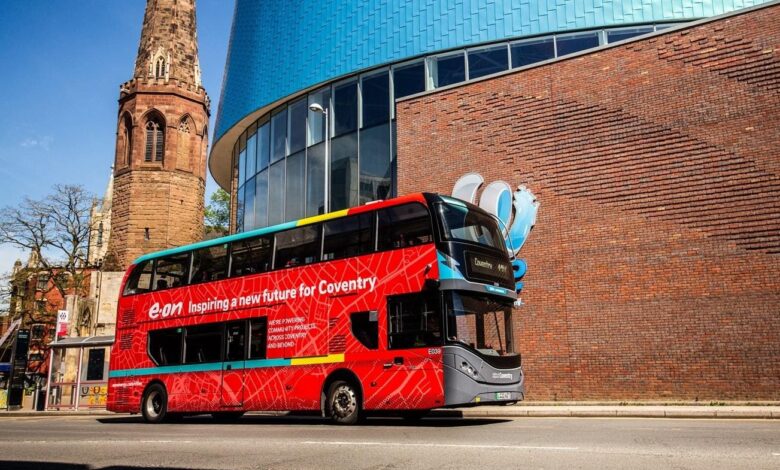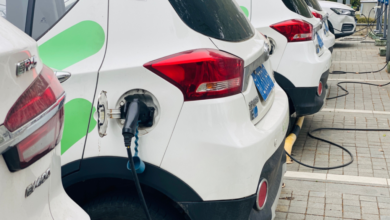Britain’s New Electrified Transport Champion Could Be… Coventry

Coventry has been central to the history of British motor industry for over a century. Daimler built its first vehicles there in 1896, and its UK heir Jaguar Land Rover (JLR) still has its head office in the city. But as British car manufacturing waned, Coventry’s automotive prowess became more past than present. For the last decade, Coventry’s MotorFest event has celebrated the city’s rich automotive heritage. Now it could be playing a leading role in promoting Coventry’s sustainable, electrified rebirth.
Coventry is aiming to have an entirely electrified bus fleet by 2025.
“MotoFest celebrated its 10th anniversary this year,” says Coventry City Councilor Jim O’Boyle. “It demonstrates the best of Coventry’s history, as the birthplace of the UK automotive industry. But MotoFest also looks to the future, including the job opportunities going forward – not just in the automotive industry but understanding new transport modes.” MotoFest reportedly brings 100,000 people to Coventry and £10 million into local businesses. However, its impact goes beyond a temporary boost for the economy.
Building On Past Success
While once famous Coventry brands like the Standard Motor Company have long gone, the famous London black cab (now electric) is still manufactured there. Jaguar Land Rover’s fortunes had looked questionable, but since the company’s acquisition by Tata in 2008, it has turned itself around completely, and is now looking towards a bright electrified future. Coventry will be a major beneficiary of this resurgence.
The Standard Motor Company was one of many brands from Coventry’s automotive past.
“The JLR Whitley HQ is here, which centers on powertrain R&D,” says O’Boyle. “They employ 6-7,000 people, which is key to the Coventry economy. Those are great jobs as well because they’re the future, they’re highly paid and they’re secure. Coventry’s got two universities that support that skill set too.” Coventry is also home to the UK Battery Industrialisation Centre (UKBIC), a £130 million national battery manufacturing scale-up facility.
MotoFest helps showcase Coventry’s past and current capabilities in the car industry, but also how it’s looking towards alternative forms of transportation. This year, a self-driving bus was on show, for example. One of MotoFest’s other main functions is to inspire people about the fun available with cars, central to which is the motorsport program, including a sprint race on a closed section of the ring road and drifting demonstrations.
“The motorsport is exciting, and it attracts a lot of people from all over the country,” says O’Boyle. “It also sparks interest in the car industry.” This aspect could be getting a big boost in the future, after the announcement that World Rallycross is in talks to stage a race in Coventry as part of MotoFest, which could help bring even larger numbers to the event. Street racing has great potential for raising the profile of a city. Even Monaco wouldn’t be so well known if it weren’t for the legendary street circuit used by Formula 1 and Formula E, among others.
The sprint race is a motorsport highlight of Coventry’s MotoFest.
World Rallycross is also hoping to build on the success of its street-based Hong Kong finale last year. This city location brought a great crowd of local people as well as die-hard motorsport fans. “If Rallycross puts Coventry on the map, with all the benefits that come from that, it has to be welcomed,” says O’Boyle. Coventry is close to several other major UK cities, including being just 21 miles from Birmingham, 38 miles from Northampton and Leicester, and even Nottingham is less than 60 miles away. The potential local audience for a World Rallycross race would be huge.
Towards A More Sustainable City
MotoFest visitors to Coventry also see a city that is taking a leadership role in providing the infrastructure for decarbonization. “We’re trying to futureproof our city, so we’ve invested quite heavily,” says O’Boyle. “We’ve got over 2,000 on-street charging points in the city now and we can see already over the last couple of years their use going up and up. We’ve only got about 2,000 electric vehicles registered here, but if you don’t put the infrastructure in, it makes it more difficult. We’ve got the most electric vehicle charging points anywhere in the country outside of London.”
Infrastructure initiatives such as public charging are key to sustainable cities.
A key element of this plan is a strategic partnership with energy company E.ON. “We signed a contract with E.ON last year after an extensive search to find a partner for a 15-year contract to help Coventry decarbonize,” says O’Boyle. This sits alongside initiatives for more sustainable public transport. “We already have 140 electric buses. By 2025 all our buses will be electric. There’s no other city anywhere in the country doing anything like this.”
“We’re proud to be working with the city of Coventry on developing a plan for the city, getting it to a point where it has removed its CO2 emissions,” says Chris Lovatt, COO, E.ON. “We’re about nine months into that relationship now. We’ve identified projects to get the ball rolling. That includes targeting insulation into residential homes, getting EV chargers into various car parks across the city, and getting a supply agreement in place for green power. We’re then working on some bigger anchor projects, for example a solar PV farm. We’re trying to get solar PV onto schools and are working to decarbonize public sector buildings.”
E.ON has also been sponsoring MotoFest for the last two years, to help make its relationship with Coventry as visible as possible. “Coventry is our home city – we’re based here,” says Lovatt. “MotoFest gives us an opportunity to put a lens on the electrification of transportation in and around the city, either traditional EVs or other electrified solutions.” Another part of its support for developing future transportation is E.ON’s sponsorship of the Veloce Extreme E team, which will be returning to Scotland in July for its next round of racing.
“The relationship we’ve had with Extreme E has been really beneficial for showcasing electric racing and what it stands for,” says Lovatt. “It brings more female racers into the sector. It’s a really great way of engaging in a topic that we need to make progress on. Its values, diversity, inclusion and innovation tick so many boxes. Veloce is a young, fast and agile organization, and that’s what we need to be too. Having Rallycross at MotoFest would be a similarly fantastic opportunity to promote change.”
The fun factor is key to public adoption of an electrified future.
“The electrification of transport is a is a real key to decarbonization,” says Lovatt. “But that has a number of other things around it – not just EV-focused energy tariffs but opportunities to use the batteries in vehicles to help solve problems like load balancing supply via vehicle to grid. From a customer point of view, there’s a very natural step once you’ve taken the plunge on an EV to think about things such as solar panels or a battery in your home and how you become more self-sufficient and sustainable.”
“To combat climate change, you’ve got to bring people with you,” says O’Boyle. This is where an event like MotoFest comes in, promoting the benefits of the future alongside its tributes to the automotive past. An increased focus on electrification, particularly with a race series like World Rallycross that showcases how competitive EVs can be, underlines the potential they offer. This could encourage more car buyers to choose a sustainable option. “When you give people a choice and they can see what the opportunities are, invariably they make the right decision.”



